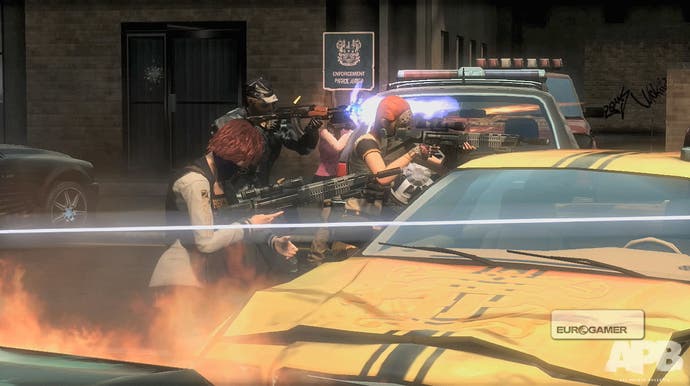The State of the MMO in 2010
When MMOs went west.
"This has a lot to do with the open-ended sandbox gameplay," Olafsson says of Eve's continued appeal, "there is no way to win, or to reach level cap, but there is always something to do. Because the high-end gameplay in EVE always involves interaction with other players - collaboration or war - there is always drama to be found." It's a way of doing things that, Olafsson suggests, has come about because of a wave of designers who were familiar with MUDs and Ultima Online. EVE's own legacy, Olafsson suggests, could soon start to appear in new generations of MMOs, as another wave of designers begin to bring their experiences with EVE to the table.
This point in the history of games - the era in which, if Barnett is right, "MMO" is becoming a meaningless badge - could be the start of significant change. Experimentation has already lead back to revolutions within the business model. When the most fundamental barrier to MMOs has always been that monthly sub, it makes sense to play with ways of getting around it. We're starting to see that experimentation mature: APB isn't going to have a subscription. Allods Online just landed a pretty well-developed MMO in the market for no pennies. It's going to make MMOs even more diverse, and that acronym even less precise.
Dwans suggests that these changes are going to be about diversity, too, rather than straight-up competition. "I don't think it's too much of a threat to our direct subscribers because so far the free-to-play stuff isn't quite hitting the same audience, or the same market," he says. "None of them, so far, do the same kind thing that we're doing. I also think of free-to-play games as supplementary. Since they're free, you don't have to drop your subscription to play them, you can play them in addition to the game you are paying for."

But there could, Dwans believes, be another consequence of the free-to-play game: a change in player tastes and expectations. Just as WOW might have ripened players for Eve, so the MMO has traditionally asked a lot in terms of time and attention from its players. We understood that, and committed our time, or not. Free-to-play could change that. "The reward structure in free-to-play is more casual," says Dwans. "They're quick hits, and people can get their cookie quite quickly. We have to consider that: how can we make sure people feel rewarded in our more standard MMO, and don't get bored and leave?"
It's perhaps this stuff that designers are referring to when they start saying - as so many did in the wake of the Game Developers Conference in March - that they'd have to start paying attention to FarmVille and the other Facebook games. It's not so much that these games are competition for traditional MMOs in any direct sense, but that they could end up changing what people expect, or will tolerate, from their moment-to-moment gaming experience. They could change things at the level of tastes and expectations.

Back on the phone with Barnett, one thing becomes obvious: whatever the shape of the MMO market now, and wherever the various parties are heading the in the future, there's life in the gigantic subscriber MMO yet. Star Wars: The Old Republic is rumbling over the horizon like a Blizzard-sinking Star Destroyer. BioWare's resources for the project are colossal, and the rest of EA's hive mind is rallying behind it. I doubt it will be the last of the major MMOs, either. Whatever anyone else has to say about the massively multiplayer space, and however many pocket-sized indie projects come to light, I suspect it will still be the big boys, the captains of BioWare and Blizzard, who will have the final word.
